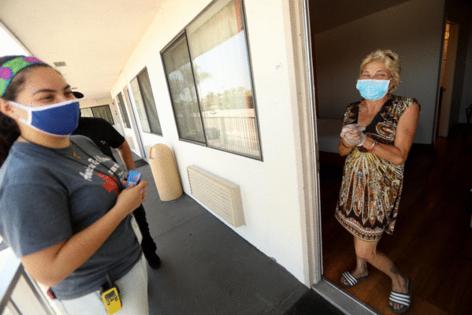California should expand pandemic shelter program, study says. How Project Roomkey succeeded
Published in News & Features
SACRAMENTO, Calif. — A pandemic program created to shelter California’s vulnerable homeless population during COVID-19 helped thousands of people stabilize and transition into housing, a new independent study has found.
There’s just one problem: the program was expensive and the federal government is backing out of reimbursing local governments hundreds of millions of dollars for it. The program no longer operates in Sacramento County.
The report also comes at a time when California is grappling with its homelessness strategy and a lack of data to determine what is most cost-effective.
More than 62,000 people received temporary housing under the state’s Project Roomkey, which was launched in April 2020. The program moved medically vulnerable people from the streets and congregant shelters into empty hotel and motel rooms in an effort to isolate them and reduce their risk of contracting COVID-19.
While it was not designed as a rehousing program, about one-third of participants transitioned into permanent or temporary housing after leaving, according to a study commissioned by the California Health Care Foundation and conducted by research firm Abt Global.
Another quarter of people temporarily sheltered under the program moved into other emergency shelters and 15% returned to unsheltered homelessness. Destinations for 18% of participants were unknown after they left, and 4% went to hospitals, substance use treatment facilities or other institutional settings.
Researchers gathered data for the study through surveys and interviews with counties and tribes that accepted Roomkey funding grants, as well as visits to five sites across the state, and final outcome assessments from participants in Los Angeles, Ventura and Tulare Counties.
“Not only did Project Roomkey meet its original goal of saving the lives of people who were experiencing homelessness but the program enhanced how interim housing is designed and operated in some communities across California,” the study concludes.
Researchers noted individual rooms gave participants privacy and allowed them to bring possessions and pets.
“As a result, in some communities, [Roomkey] was able to bring people indoors who had previously been unwilling to use traditional, congregate shelters,” said Nichole Fiore, the study’s lead author.
...continued
©2024 The Sacramento Bee. Visit at sacbee.com. Distributed by Tribune Content Agency, LLC.







Comments